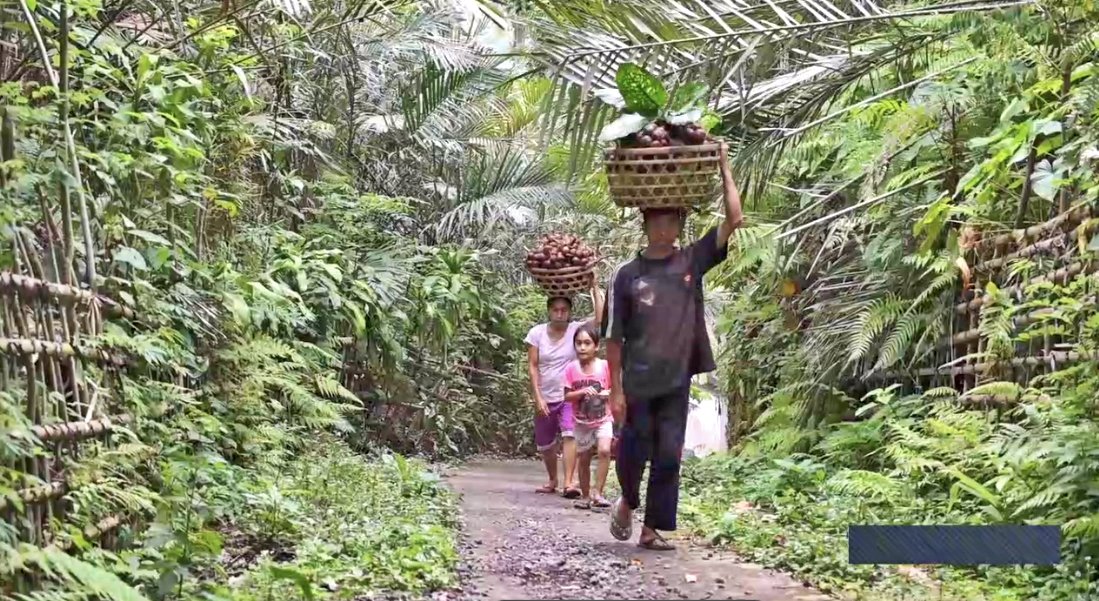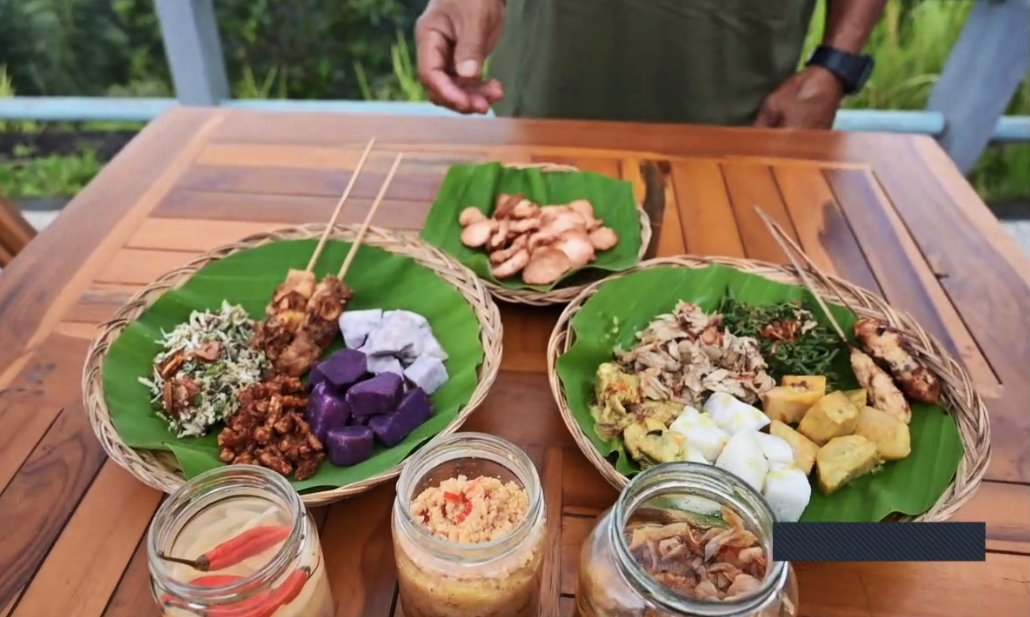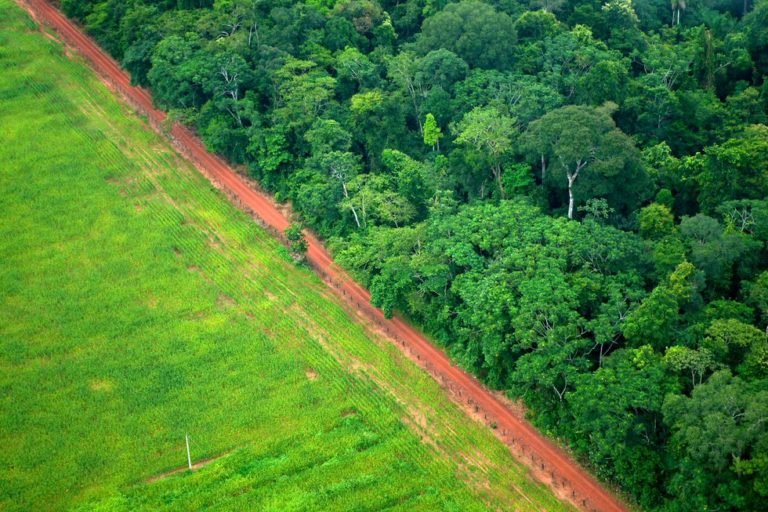- Sibetan village on the Indonesian island of Bali is renowned for its organic snakefruit, known locally as salak.
- But following each biannual harvest, farmers face plunging prices of the salak fruit due to oversupply.
- Salak farmer Made Surjani says visitors are welcome to view local agroforestry practices, but that Sibetan farmers see themselves as farmers first and foremost.
DENPASAR, Indonesia — People in Sibetan village got used to wearing face masks before the coronavirus pandemic shut down Bali’s tourism industry for two years and killed more than 4,000 on the Hindu-majority island.
In 2017, families hurried to evacuation shelters after Bali’s Mount Agung erupted just 10 kilometers (6 miles) away from the village in Karangasem district, caking farmers’ homes and fields in thick ash. The village government responded by distributing masks to protect against the dust.
The snakefruit, known locally as salak, was one of the few trees to reliably bear fruit in the aftermath of the 2017 eruption. The salak tree also weathered a catastrophic eruption in 1963, in which up to 1,500 people were killed. Today in Sibetan, farmers are tapping the island’s newly reopened tourism industry to raise incomes from their local agroforestry system, in which the resilient salak tree is a mainstay.
“We aren’t going to switch over to becoming a tourist attraction,” said Made Sujana, one of the pioneers of salak farming in the area. “We remain farmers.”
Sujana, known locally as Jro Dukuh Sakti, was so influential in introducing salak to local agroforestry practices that the neighborhood is commonly referred to as the Dukuh neighborhood.
Agroforestry is an environmentally positive land-management practice with proven benefits for income generation and food security. A 2021 study published in the journal Agroforestry Systems identified a range of benefits from agroforestry in Indonesia, including a 20% increase in nutritional diversity.
At an online tour of Sibetan in May, as restrictions on travel began to ease, Sujana presented a glass of salak wine and displayed his technique of opening the scaly fruit, applying precise pressure with his palm before removing the skin.
Twenty years ago, Sibetan and three other rural areas of Bali together joined with the Wisnu Foundation to form Jaringan Ekowisata Desa (Village Ecotourism Network). The idea was to cultivate community-owned ecotourism stays in one of the world’s most sought-after tourism destinations (more than 6 million people flew into Bali’s Ngurah Rai International Airport in 2019, the year before the pandemic closed the airport to almost all tourist arrivals).
There are no fewer than 15 species of salak planted among the coconut palms and other fruit trees in Sibetan. A 2019 study published in the International Journal of Community Service Learning recorded a total planting area of 5,000 square meters (nearly 54,000 square feet) in Sibetan, containing around 1,200 salak trees.
Farmers here produce around 1.8 metric tons of salak at each biannual harvest, a volume so large it creates a problem: too much of a good thing.
The glut at harvest distorts market prices so substantially that the price per kilogram tanks from around 5,000 rupiah (34 U.S. cents) to only 1,000 rupiah (7 cents), or from 15 cents a pound to 3 cents a pound. Farmers face a choice between selling for pennies on the dollar, or watching a mountain of fruit rot in the garden.

Sujana continues walking along bamboo fences marking the salak planting area, where the spiky trees grow to around head height.
Visitors to Sibetan can stay at a guesthouse run by residents, and tour a planting area where several variants of salak tree grow in two broad groups: the traditional Bali salak and the sugar salak, which produces smaller fruit.
“[Visitors] can interact directly with residents,” Sujana says.
Sugar salak is increasingly being cultivated here because it tastes the sweetest. Another variant, salak nanas, is also preferred because of the subtle pineapple aroma. The banyan salak is half the size of other species of trees, while salak kelapa has fewer thorns on its stems.
“This one is quite rare in the gardens, not much is planted,” Sujana says. “It’s mostly sugar salak.”
Savants of salak, which can be used to make kombucha and wine, will find numerous other types of the fruit in Sibetan, each with subtle distinctions in aroma, taste and texture.
As the rainy season begins, farmers in Sibetan process salak into chips and dodol, a sweet, taffy-like reduction popular in South and Southeast Asia.
All salak trees in Sibetan are grown without chemical fertilizer. Instead, the soil is maintained using compost and manure.
Although the planting area may look like a monoculture from a distance, the upland is covered in a variety of fruit trees: coconut, sugar palm, mangosteen, white mango, langsat, gowok and melinjo.

This agroforestry configuration helps sustain the nearby Moding spring, which is operated by the regional government-owned water utility. A separate water source at the nearby Beji temple is used for holy rites by Balinese Hindus.
In Sibetan, seasonal agricultural rhythms blend with devotion. Leaves from a sacred sugar palm tree (Arenga pinnata) are used in ceremonies. The tree is also seen by residents of Sibetan as providing a buffer from landslides, and a guardian of the water source.
Jaringan Ekowisata Desa, the tourism cooperative, began two decades ago with a handful of early-adopting villages like Sibetan. The organization now provides cultural and educational tours of a dozen communities in Bali hidden from the glare of the island’s more familiar tourist attractions.
Sujana, Sibetan’s salak pioneer, says visitors are more than welcome, but that Sibetan will always see itself as a farming community through and through.
“But if you do want to come,” Sujana says, “we offer our stories and our products.”
Banner image: A farmer shows a salak variant in Sibetan Village, Bali. Image from a virtual tour video.
Related listening from Mongabay’s podcast, listen here:
Citations:
Duffy, C., Toth, G. G., Hagan, R. P., McKeown, P. C., Rahman, S. A., Widyaningsih, Y., … Spillane, C. (2021). Agroforestry contributions to smallholder farmer food security in Indonesia. Agroforestry Systems, 95(6), 1109-1124. doi:10.1007/s10457-021-00632-8
Krisna, A. (2019). Community service of agro tourism in sibetan village. International Journal of Community Service Learning, 3(1), 18-21. doi:10.23887/ijcsl.v3i1.15638
A version of this story was reported by Mongabay’s Indonesia team and first published here on our Indonesian site on May 2, 2022.












